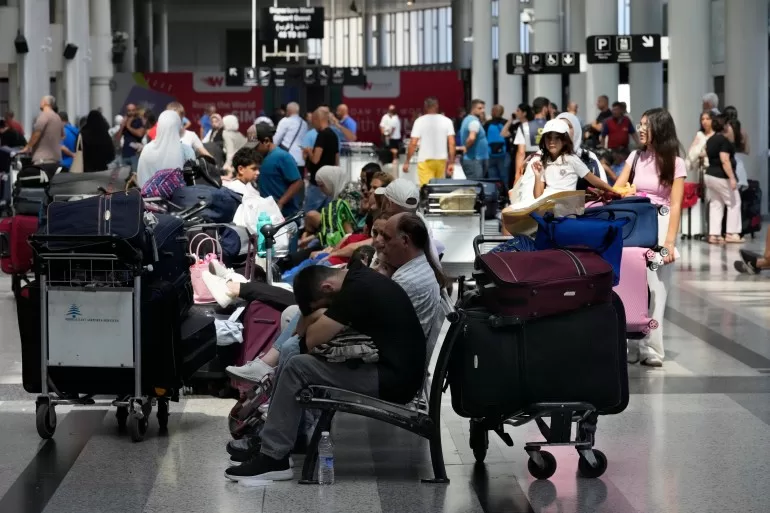Beirut, Lebanon – On July 27, Loubna El-Amine was waiting to board a connecting flight from Romania to Lebanon’s capital Beirut, having travelled from her family’s home in the United Kingdom.
As boarding started, El-Amine received news that a projectile had killed 12 Druze children and young people in the Israeli-occupied Golan Heights. Israel blamed the Lebanese armed group Hezbollah, which denied responsibility for the incident.
Fearing how Israel would respond, El-Amine, a Lebanese-American, discussed with her husband whether to board with their three children or not.
Moments later, they got on the plane.
Shortly after they arrived in Beirut, Israel assassinated one of Hezbollah’s top commanders, Fuad Shukr, by launching a rocket into a residential building in Dahiyeh, a district in southern Beirut. They then killed Hamas’s political chief Ismail Haniyeh in Iran’s capital Tehran during the inauguration of President Masoud Pezeshkian.
Both assassinations have pushed the region to the brink of an all-out war. Iran and Hezbollah have both vowed to retaliate against Israel, likely via a coordinated attack alongside other Iranian-allied armed groups in the region, analysts have previously told Al Jazeera.
The shadow of a major war has compelled El-Amine and her husband to cut their trip short and book a flight to Turkey for August 10, while some commercial flights are still available.
“Even if there doesn’t end up being direct danger, we had to think if we really wanted to put our children through this level of stress,” El-Amine, 40, told Al Jazeera from a cafe in Hamra, a bustling district in Beirut.

Fear and rage
El-Amine is one of millions of Lebanese civilians wrestling with life-and-death decisions as they wait anxiously to see if a major conflict with Israel will devour their tiny country, which has under six million people and lies to Israel’s north.
Many are trying to live day-to-day despite the growing fear that a broader conflict is imminent, while also holding faint hope that regional tensions won’t boil over.
“The tensions feel different this time [since the Israeli assassination],” El-Amine said, in resignation. “But a part of me hopes that maybe there will be a ceasefire tomorrow, somehow.”
Since October 8, Hezbollah has engaged Israel in a low-level conflict in a stated attempt to “reduce pressure” on Hamas in Gaza, where Israel has killed about 40,000 people and displaced nearly the entire 2.3 million population.
Israel’s war on Gaza began after a Hamas-led attack on Israeli military outposts and communities on October 7, in which 1,139 people were killed and 250 were taken captive.
Hezbollah has repeatedly promised to stop attacking Israel if a ceasefire is secured in Gaza, but despite negotiations ongoing for months, no deal has been agreed.
In Lebanon, the blame for that is largely placed on Israel, with the perception that Israeli Prime Minister Benjamin Netanyahu’s government does not actually want an agreement, and wants to continue the war in Gaza, and expand it to the wider region.
In light of that, many Lebanese civilians see continued Western support for Israel as a moral failure and cannot bring themselves to escape to Europe or North America.
“I do not want to go and pay taxes to these murderers,” said Majd Akaar, a software engineer working from a cafe in Hamra. “It would also feel very wrong on a fundamental level to leave right now, as if I’m abandoning Lebanon and my people.”
Akaar acknowledged that he has some trepidation about what could befall Lebanon in a regional war. He described a recent traumatising call with a friend in south Lebanon, which has suffered the brunt of Israel’s attacks since October.
They were on a video call when his friend showed him an ordnance that fell near his home and then suddenly exploded.
“I remember just hearing her screaming. I panicked until she called me back 10 minutes later,” recalled Akaar, 36.

Resignation
In a small bedding and furniture store on the corner of Hamra Street, Sirine Sinou said that her family can’t possibly leave Lebanon or else they will lose their business.
She added that her husband and two children are not taking major precautions – such as buying food or house supplies in bulk – in case a larger war breaks out.
“We did that during the coronavirus [COVID-19 pandemic] and then we ended up throwing out so much stuff,” she told Al Jazeera. “Whatever is written [our fate], is going to happen.”
In the event that Israel begins bombing neighbourhoods and civilian structures in Beirut – a strategy Israel calls the “Dahiya doctrine” in reference to the Dahiyeh/Dahiya neighbourhood, and which it used in the 2006 war against Hezbollah – then Sinou and her family may head to their small ancestral village in north Lebanon, which is far from the capital.

Assad Georges, 21, is another who says he is staying put in his hometown of Zahle – which is about 55 kilometres (34 miles) from Beirut – if a major conflict erupts.
On Monday afternoon, he spoke to Al Jazeera while waiting with his girlfriend to have lunch with his parents in Hamra. They held hands as Georges spoke about the terrifying sounds of war that he frequently hears in his town.
“There is nothing too serious happening in Zahle now, but we do often hear bombs and sonic booms hitting towns to the west of us,” he told Al Jazeera.
Minutes before his parents walked into the restaurant, Georges said that civilians have been on edge for months due to the cycle of tensions mounting and then simmering down.
However, he does believe that a wider conflict now looms over Lebanon.
“With the US and UK sending warships [to the coast of Israel], it feels like they are preparing for something to happen,” he said, clasping his girlfriend’s hand.
“Now that Israel is almost finished in Gaza, I think their next plan is to try and get rid of Hezbollah.”
